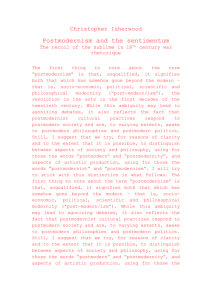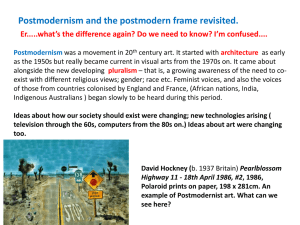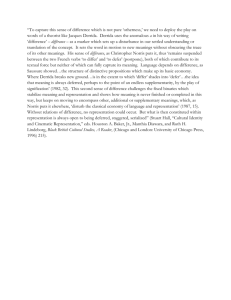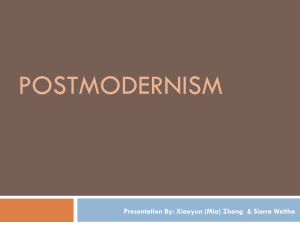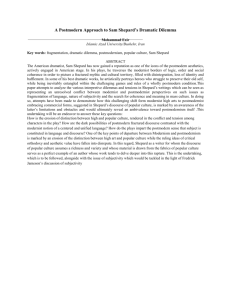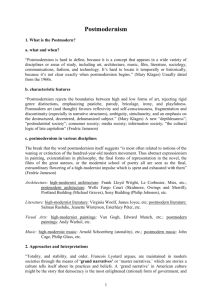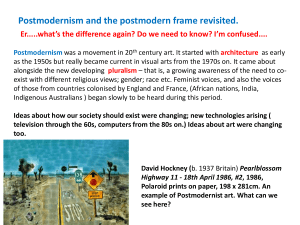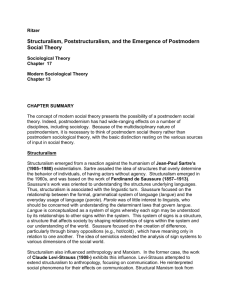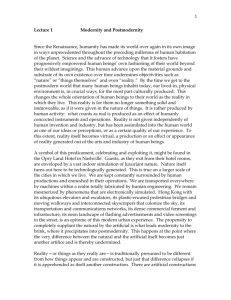Annotated Bibliography sample
advertisement
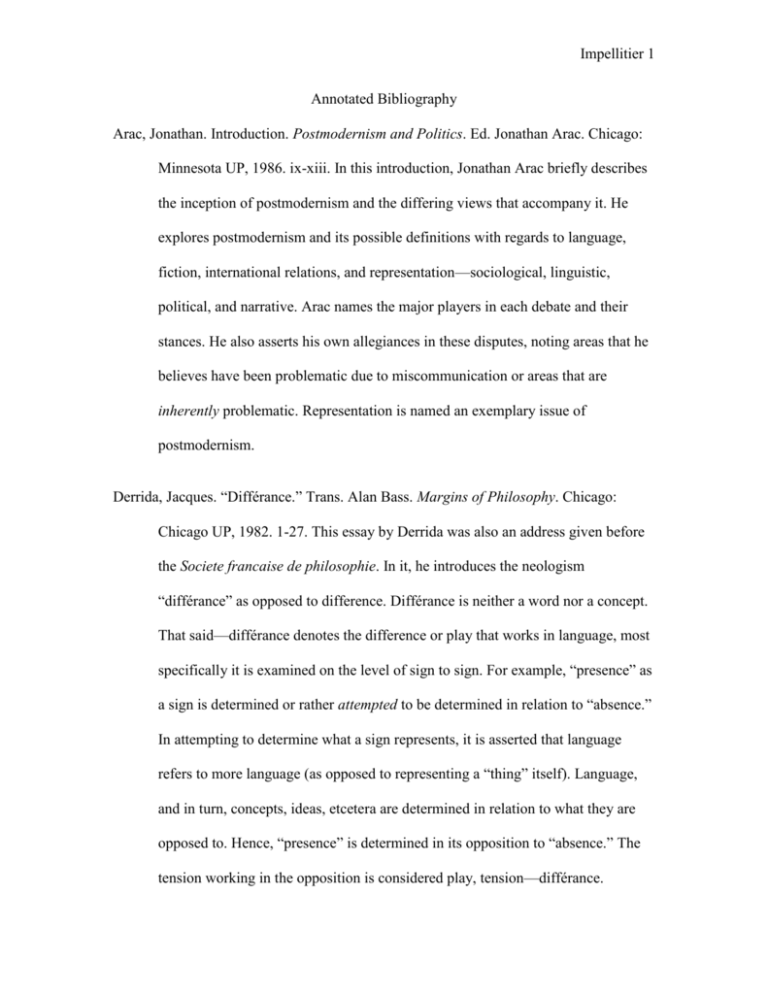
Impellitier 1 Annotated Bibliography Arac, Jonathan. Introduction. Postmodernism and Politics. Ed. Jonathan Arac. Chicago: Minnesota UP, 1986. ix-xiii. In this introduction, Jonathan Arac briefly describes the inception of postmodernism and the differing views that accompany it. He explores postmodernism and its possible definitions with regards to language, fiction, international relations, and representation—sociological, linguistic, political, and narrative. Arac names the major players in each debate and their stances. He also asserts his own allegiances in these disputes, noting areas that he believes have been problematic due to miscommunication or areas that are inherently problematic. Representation is named an exemplary issue of postmodernism. Derrida, Jacques. “Différance.” Trans. Alan Bass. Margins of Philosophy. Chicago: Chicago UP, 1982. 1-27. This essay by Derrida was also an address given before the Societe francaise de philosophie. In it, he introduces the neologism “différance” as opposed to difference. Différance is neither a word nor a concept. That said—différance denotes the difference or play that works in language, most specifically it is examined on the level of sign to sign. For example, “presence” as a sign is determined or rather attempted to be determined in relation to “absence.” In attempting to determine what a sign represents, it is asserted that language refers to more language (as opposed to representing a “thing” itself). Language, and in turn, concepts, ideas, etcetera are determined in relation to what they are opposed to. Hence, “presence” is determined in its opposition to “absence.” The tension working in the opposition is considered play, tension—différance. Impellitier 2 ---. “Sending: On Representation.” Intersections: Philosophy and Critical Theory. Ed. Gale L. Ormiston and Alan D. Schrift. Albany: NY Press, 1990. 107-138. Derrida here explores the idea, word, and concept of what it means to “represent.” The introduction of the work begins with a quote that counsels that the word “representation” is something equivocal that ought never to designate something objective; it should be reserved. Bearing this, the essay works on determining representation, its contexts and its historical meanings. Derrida explores the problems of translation and delegation as issues of representation. Underscoring this all is how context determines everything for representation, for language. The fuller the context, the more the determination of meaning can be fixed; however, it can never be fixed completely. Every context has a context in itself, with overlapping contexts obfuscating the pinning down of meaning. Foucault, Michel. The Order of Things. New York: Random House, 1970. In this critical work, Foucault explores the idea of “man” as a constructed idea informed by scientific knowledge. This book is a cross-discipline study working in such areas as epistemology, ontology, linguistics, literature, history, and philosophy. The sections particularly relevant to my project are Representing, The limits of representation, and Labour, life, language. Hume, Kathryn. “The Heraclitean Cosmos of Kurt Vonnegut.” Papers on Language and Literature: A Journal for Scholars and Critics of Language and Literature 18.2 (1982) : 208-224. Hume’s article explores Vonnegut’s “fictional cosmos” and the techniques and philosophies involved in it. The article seems written in response Impellitier 3 to specific critics and reviewers who have denounced Vonnegut’s work as either reductive, childish, or simplistic. Hume refers to this reception as “hostile” and “uncomprehending.” A primary problem she states with their critiques is that critics look at a single work instead of the holistic cosmos of Vonnegut’s texts. Hume goes on to explain Vonnegut’s techniques and how those techniques support literary and profound exegeses of his texts. Morse, Donald E. “The ‘Black Frost’ Reception of Kurt Vonnegut’s Fantastic Novel Breakfast of Champions (1973).” Journal of the Fantastic in the Arts 11.2 (2000): 143-53. In this article, Morse writes back to those critics who have critiqued Breakfast of Champions harshly. Specifically those critics surrounding the novel’s inception. He addresses common issues that have been taken with the novel, such as narrative style and the author as a character in his own book. Morse combats these critics by framing Breakfast of Champions as an experimental novel whose “literary offenses” are “wonderfully self-reflexive,” “post-modern,” and “fantastic.” He examines how Vonnegut’s parody of the postmodern novel trespasses boundaries and earns him a “black frost” reception within literary circles. Nealon, Jeffrey T. “Thinking\Writing the Postmodern: Representation, End, Ground, Sending.” Boundary 2 20.1 (1993) : 221-241. In this essay, Nealon examines the problem of writing and thinking about the postmodern issue of representation. Grounding himself in Jacques Derrida and Michel Foucault. Nealon first addresses the difficulty in talking about representation because of the inability of Impellitier 4 the subject to step outside of representation in order to discuss it. Therefore, contextualizing postmodernism is an important aspect of discussing it. Since representation cannot be pointed to, the innermost/contextualized point of representation is asserted as the best place to start a discussion. Representation as a linguistic, literary, and philosophical issue then comes into play as representation wears many hats and to talk about it wearing one is also infiltrating other realms as well. Radhakrishnan, R. “Reality, the Text, and Postmodern Representation: A Question in Theory, or Theory in Question.” Postmodern Fiction: A Bio-Bibliographical Guide 2 . Ed. Larry McCaffery. New York: Greenwood Press, (1986). 229-243. This article explores issues in postmodern criticism and argues that there is a “definitive break from traditional modes of representation” (229). This break is contextualized as emerging within critics’ analyses of postmodern fictional works. Radhakrishnan’s work is contextualized in Foucault’s The Order of Things. Specifically, Radhakkrishnan focuses on Foucault’s exploration of man as a subject of language. He asserts that Foucault’s concept of language “shatters the very identity of literature” (232) which allows for a “new” critical stance to develop. How critics approach the idea of the text as reality and the text and reality as representations are central foci for this author. Szigeti, András. “Innovation and Representation in Postmodern Fiction.” AnaChronist (1997) : 133-65. In this essay, Szigeti asserts that the postmodern question manifests itself in the aesthetic question what are art and literature to be. He Impellitier 5 pinpoints a concern for legitimacy as a major tenet of postmodernism. Specifically, Szigeti targets narrative strategies in postmodern fiction as means to answering this postmodern question. He locates narrative strategies within two dominant strategies in particular: transtextuality and metafictionality. Further, these dominant strategies are analyzed within the works of Barth, Fowles, and Barthelme. Szigeti’s analyses are informed by such scholars as Genette, Habermas, Kristeva, Lyotard, and Waugh. Thiher, Allen. Words in Reflection: Modern Language Theory and Postmodern Fiction. Chicago: Chicago UP, 1984. Thiher explores the issues of language as representation. The first three chapters ground his text in the works of Wittgenstein, Heidegger, Saussure, and Derrida. The implications of this works are traced through linguistic and philosophic explorations. The problem of representation as a postmodern dilemma is a central focus. This is especially addressed in regards to language as a construct by the subject and the subject as a construct of language. Waugh, Patricia. Metafiction: The Theory and Practice of Self-Conscious Fiction. New York: Methuen, 1984. Waugh begins by defining metaficiton as a term and delineating the context for it within postmodernism. In her description regarding context, she refers to the postmodern as being defined in resistance to the “novel tradition” and in relation to modernism. Waugh offers an overview of the general perception of metafiction by scholars as being predominantly negative. There are several examples and excerpts of metafictional texts given. Besides the narrative Impellitier 6 implications for fiction, Waugh explores how narrative strategies affect or intermingle with linguistic and philosophical studies with respect to philology, ontology, and epistemology.
